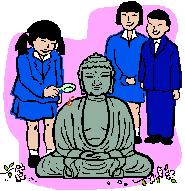 Six Contemporary Dodoistu
Six Contemporary Dodoistu
by Debra Woolard Bender
Dodoitsu
| A Japanese
fixed folk song form of 26 syllables in 7-7-7-5, the Dodoitsu comes from
the old agricultural roots of the
Gombei, the people of Japan's back-country. The majority of songs were handed down by oral tradition and were performed to the accompaniment of shamisen, a three- stringed instrument. Subject matter often includes love or humor. I Does dog
have buddha nature?
II On my fiftieth
birthday
III The time
comes to bake cookies
IV Red hibiscus
strung with vines
V Coming home
from our short tryst,
VI I'll hide
this mid-summer heat,
|
REFERENCES
BOOKS:
Twenty Dodoitsu
were collected in various dialects,
from all
over Japan between the years of 1926 and
1932 by
George Bonneau, PhD, and anthologized
between
1935-1935 in "La Sensibilite japonaise":
A Zen Harvest
: Japanese Folk Zen Sayings : Haiku,
Dodoitsu,
and Waka, edited by Soiku Shigematsu,
contains
translated dodoitsu verses.
Robin Skelton,
a Canadian poet, has written English-language
dodoitsu
in two of his books; "A Way of Walking" is the
second of
Robin Skelton's recent collections, following "Islands"
(Ekstasis,
1993), which consist of "Poems in the traditional forms
and metres
of Japan." See:
INTERNET
RESOURCES are few concerning this song-form. Seitero
Nakanishi,
a craftsman of kendais (music stands for shamisen),
writes that
dodoitsu is old Japanese love song. Most modern
Japanese,
he laments, no longer know of the songs:
Encyclopedia
Brittanica reports dodoitsu, "imitating folk song," has
26 syllables:
Other internet resources speak of dodoitsu as a "short comical song":
Also it is spoken of as "shamisen" music, with each Japanese traditional
theatrical
art having its own "deep" kind of shamisen music, including
Kabuki,
Noh, Kouta, Dodoitsu, Minyo, Tsugaru Jamisen (instrument):
For more information be sure to visit Debra Bender's site:
(Our deepest
gratitude to Debra for providing all
information
here.- Editor)